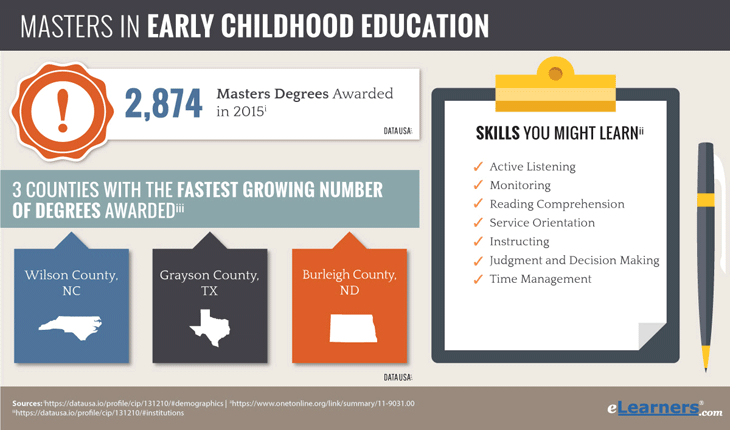Sponsored Online Programs Available
Online Masters Degree in Early Childhood Education
Earning an online masters in early childhood education teaches the importance of providing a safe, challenging environment for young children to learn. This includes how to use technology and play to develop social and cognitive skills. Many courses also look at how to create a course of study that can reach different learning styles so that all children may be able to reach their educational goals.
Fun Fact
According to the National Center for Education Statistics (NCES), 26% of children who were read to three or four times in the last week by a family member recognized all of the letters in the alphabet. This is compared to only 14% of children who were read to less frequently.
Online Masters in Early Childhood Education: Basics
The early years of a child’s education are some of the most important years. During birth through the first eight years of a child’s life, the brain develops fasters than at any other point in their life. This is when the foundation for a child’s cognitive and social skills, as well as their self-esteem and moral outlook, are developed.
As a result, early childhood education masters degree programs focus on teaching how to create a challenging and supportive learning environment for young children. Typically, education masters courses look to study concepts and theories through problem solving exercises. Then, you may apply those strategies to creating better ways of creating and teaching a course of study.
Admissions Requirements for Early Childhood Education Masters Online
To earn your online masters in early childhood education, most schools ask that you have a bachelors degree from an accredited university with a 2.3 GPA or higher. However, some schools may have other rules. These may include:
- Statement of Goals
- Official Transcripts
- Teaching Certificate (not all programs)
Keep in mind that each school has its own requirements. Check with a few options to find one that matches your goals.
What You’ll Learn with an Online Masters in Early Childhood Education
While earning your online masters in early childhood education, programs look at how to use the latest methods. Courses also cover the many tools used to evaluate the progress of students. Normally, courses also teach how to adapt your course of study to better reach students of diverse backgrounds and learning abilities. Check out some of the other topics you may study here.
- How to create lesson plans in different subjects.
- You may analyze how to observe students and evaluate their strengths and weaknesses.[i]
- Some courses cover how to meet with parents to discuss students’ progress.
- How to prepare budgets, allocate funds, and hire and train new staff members.[ii]
Online Masters in Early Childhood Education: Professional Insight
“Earning a master’s in early childhood education has helped me to become an effective parent development educator. My background in early childhood education enables me to help parents get through the early years of their children’s development and the move into elementary school, which is my greatest passion. Child development is a very in-depth field which has a lot of moving parts. Helping parents to get a clear, concise, and concrete view of where their children are on the developmental scale gives me great joy. I would not have had the in-depth
knowledge in an undergraduate program.”
 - Barbra Harvey, Executive Director of Parents, Teachers and Advocates, Inc
- Barbra Harvey, Executive Director of Parents, Teachers and Advocates, Inc
Common Online Courses in Early Childhood Education
Online early childhood education masters degree courses look at the many parts of teaching young children. Many courses focus on creating a challenging environment that can change to meet the needs of different learning styles. This may include how to use technology and how to be culturally responsive to enhance student learning.
Some of the courses you may take while earning your online masters in early childhood education include those listed here.
- Learning Theories and Instruction
- Emerging and Early Literacy Development K-4
- Methods of Teaching Elementary Math
- Exceptional Children in the Early Childhood Setting
- The Early Childhood Learning Environment
- Children, Families, and Society
- Infant and Child Development
- Elementary Curriculum and Methods
- Current Issues in Early Childhood Education
- Organization and Administration of Pre-Schools
Each school has a unique make-up. Therefore, specific course offerings and titles may change from school to school. Check out a few schools to find one that fits your goals.
Concentrations for Online Masters in Early Childhood Education Degrees
Some programs offer a number of concentrations for your early childhood education masters degree. These options can tailor your course of study to one subject of early childhood education. This may provide more focus in a particular topic and may help make you an expert in that field.
Some of the concentrations available may include those listed here.
- Teaching Early Childhood Education
- Early Childhood and Elementary Education
- Teaching Early Childhood Education and Special Education
- Administrative Management and Leadership
- Early Childhood Public Policy and Advocacy
- Teaching Adults in the Early Childhood Field
Remember that some programs may offer these or other concentrations. However, each school has its own make-up. Therefore, other schools may not offer any concentrations. You should research a few schools to find one that fits your goals.
Accreditations for ECE Programs
When searching for online masters in early childhood education, there are two main accrediting bodies. These agencies accredit programs that achieve excellence through student performance in applied knowledge of child learning. Another important factor is how programs work with families and communities to promote early childhood education concepts and theories.
The two main accrediting bodies are listed here.
- National Council for Accreditation of Teacher Education (NCATE)
- National Association for the Education of Young Children (NAEYC)
While these are the two most prominent accrediting bodies, schools that aren’t accredited aren’t bad schools. It simply means that you need to perform more research on your own to make sure that they meet similar standards.
Common Careers in Early Childhood Education
After earning your online masters in early childhood education, there are a number of careers that you may pursue. These include teaching young children in a variety of settings. Other jobs may include leadership positions that may have different responsibilities from teaching. Some of these tasks may include creating programs and hiring staff.[ii]
Some of the jobs in early childhood education, and their 2015 median annual salary, include those listed here.
- Kindergarten and Elementary School Teachers: $54,550[iii]
- Special Education Teachers, Preschool: $53,990iv
- Preschool and Childcare Directors: $45,670v
- Education Administrators, Elementary and Secondary School: $90,410vi
These jobs each have different requirements to enter the field. For instance, Kindergarten Teachers usually need a bachelors degree and a teaching license from their specific state.vii And according to O*NET, 63% of Education Administrators have a masters degree.viii Typically, a Preschool and Childcare Director only needs a college degree, experience, and state licensing.ix
However, each of these requirements may vary from state to state, including licensing requirements. Therefore, check with your state to find specific rules.
How Long Does It Take to Earn a CDA?
The specific requirements to earn your Child Development Associate (CDA) credential vary depending on which of the four CDA settings you choose. However, each requires that you complete the following.
- Obtain 480 hours of professional experience in the three years prior to applying.
- Complete education documentation.
- Have families of your current students complete family questionnaires.
- Submit a professional philosophy statement.
These are just the standard requirements. Typically, there are other requirements to earn your CDA in each of the different settings.
Take the Next Step!
Are you looking to have a positive impact on the lives of young children during their most formative years? Then take the next step to earn your online masters in early childhood education.
Click on any of the sponsored listings for more information about each school. You can even reach out to your favorites directly to request more information.
[i]bls.gov/ooh/education-training-and-library/kindergarten-and-elementary-school-teachers.htm#tab-2 [ii] bls.gov/ooh/management/preschool-and-childcare-center-directors.htm#tab-2 [iii] bls.gov/ooh/education-training-and-library/kindergarten-and-elementary-school-teachers.htm#tab-5 [iv] bls.gov/oes/current/oes252051.htm [v] bls.gov/ooh/management/preschool-and-childcare-center-directors.htm#tab-5 [vi] bls.gov/OES/current/oes119032.htm [vii] bls.gov/ooh/education-training-and-library/kindergarten-and-elementary-school-teachers.htm#tab-4 [viii] https://www.onetonline.org/link/summary/11-9032.00 [ix] https://www.bls.gov/ooh/management/preschool-and-childcare-center-directors.htm#tab-4



.png)